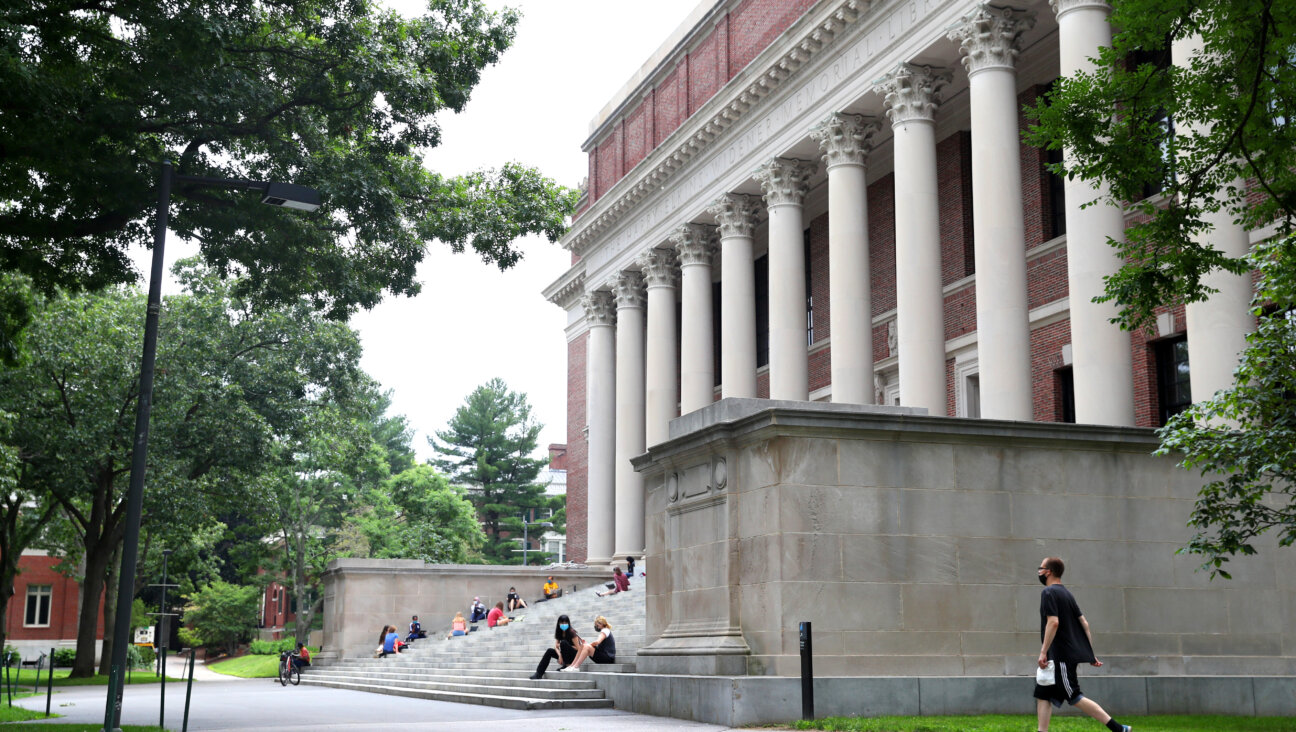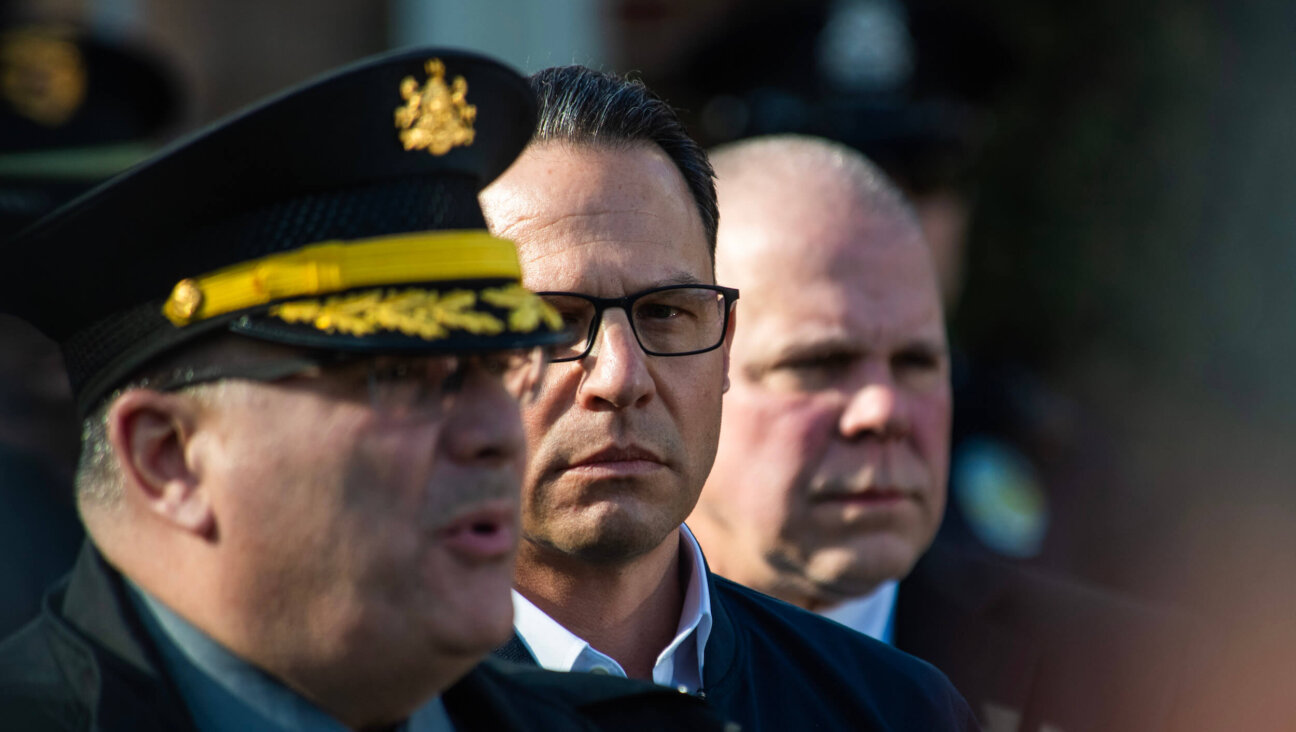Gelt Complex: Bukharians Swing Big, A First For Russian Jews, Arab Principal Honored
Bukharians Swing Big
America’s Bukharian Jewish community may only number 75,000 people, but last Thursday it was swinging well above its weight.
At a Thursday event in a Senate building, the Bukharian Jewish Congress attracted six senators and three members of the House for lunch on a busy day.
Among those paying tribute to the community were some with intimate knowledge of Bukharian Jews, like Senator Joseph Lieberman, who welcomed them with “Am Bukharian Jews Chai” (a play on the Jewish statement “Am Yisrael Chai”). There were also others who had little to do with the community — like Arkansas Senator Mark Pryor, who admitted that “there are no Bukharian Jews in Arkansas,” the state with the smallest relative Jewish population in the nation.
No one was willing to explain how the small Bukharian community pulled in such heavyweights. A staffer for one of the senators said that Bukharian representatives have been trying to arrange the event for months but only recently reached the critical mass of participants. Apart from pushing for continued support on a local level, the Bukharian representatives were not lobbying for any particular issue.
Congressman Anthony Weiner, who represents neighborhoods in Queens and Brooklyn that have heavy Bukharian populations, boasted that he had inserted a grant for a community center into this year’s budget legislation.
Lev Leviev, a billionaire diamond magnate who founded the Bukharian Jewish Congress in 1999, is the individual responsible more than anyone else for raising the public profile of the small Bukharian Jewish community. Leviev is also one of the strongest financial supporters of the Chabad-Lubavitch movement.
The lunch was set to honor Leviev, but he was detained on business in Italy and sent a note apologizing for not showing up. Among the participants was Yvette Clarke, a freshman congresswoman who repeatedly referred to the community as the “Bukhranian” Jews. While getting the name of the community wrong, Clarke, whose congressional district includes Brooklyn’s Crown Heights section, home for Chabad-Lubavitch headquarters, managed to greet participants with a “Mazel tov” that drew applause from the crowd.
— Nathan Guttman
A First For Russian Jews
The first Limmud Jewish educational conference in the former Soviet Union brought together Jews from across factional lines for a weekend of study, prayer and socializing.
Limmud, which was founded in London, has been staging Jewish educational conferences around the world for 26 years, bringing together diverse bodies of Jews. In the former Soviet Union, however, organizing this type of undertaking proved to be a monumental challenge due to the many intra-communal disputes in the region.
At Limmud’s October 18 opening ceremony, both of Russia’s chief rabbis made a rare joint appearance. Rabbi Berel Lazar of the Chabad-led Federation of Jewish Communities of Russia, whose group has dominated Jewish life in recent years, and Rabbi Adolf Shayevich of the Congress of Jewish Religious Communities and Organizations of Russia took the stage, one after the other, to welcome the participants.
There were 700 attendees, mostly young adults, at the event, which was held at the Pakrovskoe Resort in the Moscow suburbs. Lectures covered subjects as diverse as “Halacha and Pregnancy” and “Old Wine in New Bottles,” which focused on medieval Jewish poets.
The event cost $1.2 million, and the funds were raised almost entirely by foreign donors, underscoring the continuing difficulty of fundraising in a society with virtually no history of charitable giving.
But among veterans there was cautious optimism that the unity of the Limmud conference just may be a sign that Russian Jewry is moving beyond hyper-factionalism.
“I think we have an opportunity to see more cooperation,” said Mark Levin, the executive director of NCSJ, which supports Jewish life in the former Soviet Union.
— JTA
Arab Principal Honored
A politically progressive Jewish organization honored the controversial former principal of New York’s first Arabic-language public school.
Jews for Racial and Economic Justice gave the Rabbi Marshall T. Meyer Risk-Taker Award to Debbie Almontaser, a founder and former principal of Brooklyn’s Khalil Gibran International Academy.
Since its planning stages, the academy has provoked suspicion among those who see it as a breeding ground for Islamist extremism. The controversy over the school deepened — and became focused on Almontaser — when the then-principal declined to denounce T-shirts emblazoned with the words “Intifada NYC.” Almontaser resigned from the school just weeks before it was scheduled to open.
“Debbie has dedicated her whole life to Muslim and interfaith communities and the Muslim commitment to peace and justice,” said Dara Silverman, director of JFREJ. “We reject the smear campaign that was waged against her this summer.”
JFREJ is a New York-based organization that works primarily with and on behalf of people of color, low-income people and immigrants. The group has come under fire from Jewish organizations that are more mainstream for its left-wing politics and particularly for its support of the International Solidarity Movement, a pro-Palestinian group.
A press conference early last week marked Almontaser’s first public appearance since she stepped down from her post. She told reporters that she had been pressured by the Department of Education to resign, an allegation the department denies. She announced that she is preparing a lawsuit against the department and that she aims to be reinstated at Khalil Gibran. During Almontaser’s second recent public appearance, at the JFREJ awards ceremony, her voice came close to breaking as she made a short acceptance speech.
“There is one phrase that is common to the Arab and Jewish communities: yed b’yed, hand in hand,” she said. “I hope we will continue building bridges together.”
Almontaser praised JFREJ, calling the group “one of the most wonderful organizations in supporting the Arab and Muslim communities after 9/11.” she also praised the late rabbi and human rights activist Marshall T. Meyer, for whom her award was named.
In an interview with the Forward, Silverman said that Almontaser has been a longtime ally of the Jewish community. The director pointed out that Almontaser has been honored by other Jewish organizations in the past.
— Marissa Brostoff
The Forward is free to read, but it isn’t free to produce

I hope you appreciated this article. Before you go, I’d like to ask you to please support the Forward.
Now more than ever, American Jews need independent news they can trust, with reporting driven by truth, not ideology. We serve you, not any ideological agenda.
At a time when other newsrooms are closing or cutting back, the Forward has removed its paywall and invested additional resources to report on the ground from Israel and around the U.S. on the impact of the war, rising antisemitism and polarized discourse.
This is a great time to support independent Jewish journalism you rely on. Make a Passover gift today!
— Rachel Fishman Feddersen, Publisher and CEO
Most Popular
- 1

Opinion My Jewish moms group ousted me because I work for J Street. Is this what communal life has come to?
- 2

Fast Forward Suspected arsonist intended to beat Gov. Josh Shapiro with a sledgehammer, investigators say
- 3

News Student protesters being deported are not ‘martyrs and heroes,’ says former antisemitism envoy
- 4

Politics Meet America’s potential first Jewish second family: Josh Shapiro, Lori, and their 4 kids
In Case You Missed It
-

Fast Forward Jewish family killed in New York plane crash
-

Fast Forward Israelis can no longer enter the Maldives after Palestinian-solidarity ban goes into effect
-

News Harvard is defying the Trump administration — after its own crackdown on academic freedom
-

Opinion The Passover attack on Josh Shapiro was terrifying. But don’t assume it was antisemitic
-
Shop the Forward Store
100% of profits support our journalism
Republish This Story
Please read before republishing
We’re happy to make this story available to republish for free, unless it originated with JTA, Haaretz or another publication (as indicated on the article) and as long as you follow our guidelines.
You must comply with the following:
- Credit the Forward
- Retain our pixel
- Preserve our canonical link in Google search
- Add a noindex tag in Google search
See our full guidelines for more information, and this guide for detail about canonical URLs.
To republish, copy the HTML by clicking on the yellow button to the right; it includes our tracking pixel, all paragraph styles and hyperlinks, the author byline and credit to the Forward. It does not include images; to avoid copyright violations, you must add them manually, following our guidelines. Please email us at [email protected], subject line “republish,” with any questions or to let us know what stories you’re picking up.














